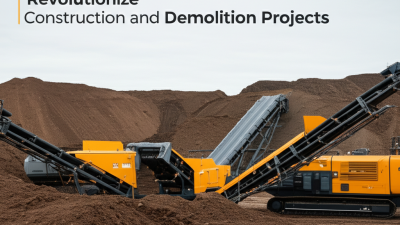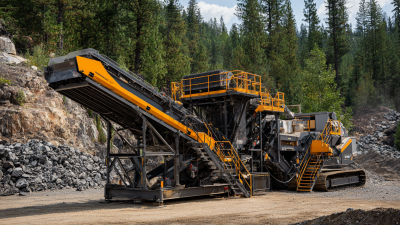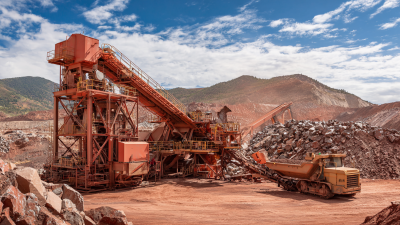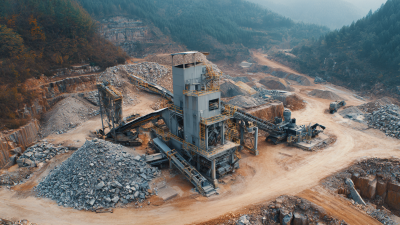In recent years, the construction and demolition industries have witnessed a transformative shift driven by technological advancements, with the Mobile Stone Crusher emerging as a pivotal player in enhancing efficiency and sustainability.
According to a report by Research and Markets, the global mobile stone crusher market is projected to grow at a CAGR of over 6% through 2027, reflecting a rising demand for portable crushing solutions that cater to modern project requirements.
These innovative machines not only streamline material processing on-site but also minimize transportation costs and environmental impact, aligning with the industry’s push for greener practices.
By integrating advanced features such as easy maneuverability and rapid set-up times, Mobile Stone Crushers have revolutionized the way construction debris is managed, offering robust solutions that significantly enhance productivity and project turnaround times.

Mobile stone crushers have emerged as a game-changer in construction workflows, streamlining processes and enhancing productivity on-site. These highly portable machines allow for the crushing of large rocks and debris directly at the job site, significantly reducing the need for transportation and handling of materials. This not only saves time but also minimizes costs associated with moving heavy materials to and from the site, which can often lead to delays in project timelines.
Moreover, the versatility of mobile stone crushers enables them to adapt to various construction environments, from urban demolition projects to remote construction sites. With their ability to process different types of materials, such as concrete, asphalt, and natural stone, these machines provide contractors with the flexibility to tackle diverse challenges. By integrating mobile stone crushers into their workflows, construction companies can enhance their operational efficiency, reduce waste, and adhere to sustainability goals by recycling materials on-site.
Mobile stone crushers represent a significant advancement in construction and demolition projects,
particularly in enhancing efficiency during waste management and material repurposing. One of their key features is the ability to
integrate seamlessly with BIM-driven digital twins, which facilitate the precise planning and execution of demolition activities.
This technology enables real-time monitoring of waste generation and material recovery, ensuring that construction sites operate
with minimal environmental impact.
Moreover, mobile stone crushers contribute to the sustainable management of demolition waste by allowing for on-site processing.
Instead of transporting large amounts of debris to distant locations, these crushers break down materials right where they are generated.
This not only reduces transportation costs and emissions but also promotes the reuse of materials,
aligning with the industry's shift towards more eco-friendly practices. As urbanization continues to accelerate, the demand for
efficient and sustainable solutions in construction and
demolition becomes even more critical, making mobile stone crushers an invaluable asset.
Integrating mobile stone crushers on construction and demolition job sites requires careful planning and adherence to best practices to maximize efficiency and safety. First and foremost, site assessment is crucial. Before deploying a mobile crusher, contractors should evaluate the project’s layout, ensuring that the crusher can be positioned strategically to minimize material transport distances. This involves creating a designated zone for the crusher, with ample space for loading and maneuvering materials. Additionally, dust management systems should be in place to protect workers and nearby areas, utilizing water sprays or dust suppressants to maintain air quality.
Furthermore, proper training for operators is essential to optimize the use of mobile crushers. Operators should be familiar with the machine’s technical specifications, maintenance requirements, and safety protocols. Regular training sessions can help staff stay updated on best practices, including the correct feeding techniques to avoid blockages and the importance of conducting pre-operation checks. Implementing a routine maintenance schedule will also ensure that the equipment functions efficiently, reducing the risk of downtime during critical project phases. By prioritizing these best practices, construction teams can harness the full potential of mobile stone crushers, leading to smoother operations and more successful project outcomes.
The advent of mobile stone crushers has brought significant changes to construction and demolition projects, particularly when comparing them to traditional stone crushing methods. Traditional crushers are often stationary, requiring fixed installations and substantial time and labor for setup. They necessitate a well-planned logistics system to transport materials to and from the site, which can lead to delays and increased operational costs. In contrast, mobile stone crushers are designed for on-site processing, allowing for immediate transformation of materials without the need for dedicated transportation infrastructure. This flexibility significantly reduces downtime and enhances project efficiency.
Furthermore, mobile stone crushers offer advanced technology that traditional methods cannot match. Many mobile units are equipped with intelligent automation features, allowing for precise control over the crushing process and the ability to monitor productivity in real-time. This not only improves safety but also ensures optimal resource utilization. The ease of mobility enables operators to quickly relocate equipment to different project sites, maximizing uptime and efficiency across multiple jobs. As a result, mobile stone crushing methods are reshaping industry standards, enabling faster project completion and lowering overall costs while delivering high-quality output.
Mobile stone crushers are playing a crucial role in maximizing safety and productivity on construction and demolition sites. Traditional methods of material handling often involve heavy machinery that can pose significant risks to operators and site workers. In contrast, mobile stone crushers are designed to compactly integrate into ongoing projects, allowing for on-site processing of rubble and debris. This not only minimizes the need for transport but also reduces exposure to potential hazards associated with moving large, heavy materials from one location to another.
Moreover, these innovative machines bolster productivity by significantly speeding up the crushing and recycling processes. Contractors can quickly transform waste materials into reusable aggregates, streamlining workflows and cutting down on downtime. Enhanced mobility allows teams to reposition the machinery as needed, ensuring optimal workflow without the delays typically associated with traditional stationary equipment. As a result, mobile stone crushers not only enhance safety protocols by limiting equipment movement but also improve overall project efficiency, paving the way for a more sustainable approach to construction and demolition projects.






